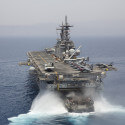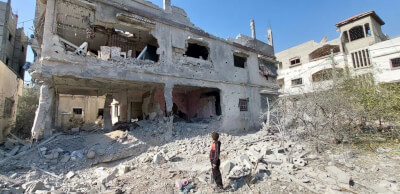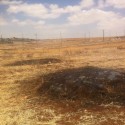By Gamal Gasim

Several weeks have passed since the beginning of the Saudi-led military operation against the forces of the Houthis-Saleh alliance. While Saleh has made a pretense of looking for a political solution, his forces have joined the Houthis for intense fighting in Aden, Taiz, and Mareb.
The Saleh and Houthi forces have indicated no inclination toward political surrender to end the current conflict. Despite heavy military strikes by the Saudi-led coalition in Aden, Sana’a, and other key cities, Aden could still fall into the hands of Saleh and the Houthis if no immediate and overwhelming military backup is forthcoming.
Airstrikes by the Saudi coalition in support of the popular resistance against the Saleh-Houthis alliance did too little to save the city. Furthermore, the increased civilian death toll in Aden and the dire shortage of basic food items and clean water are compounding human misery in a city that once was the jewel of Yemen’s modern urban centers.
Before Hadi’s escape to Aden in February 2015, few would have predicted it as a key battleground between the Saleh-Houthis alliance and President Hadi’s supporters. Why then has Aden suddenly become so important for the Saleh and Houthi forces? Aden represents both a strategically important and politically prominent symbol in Saleh’s psychological war against the Saudi-led coalition and President Hadi’s supporters.
Aden fell into Saleh’s hands once before after the short-lived but very brutal civil war of 1994. Just days before the beginning of the Saudi-led Decisive Storm operation, Saleh appeared overconfident about his chances of military victory in Aden. He warned Hadi that unlike in the 1994 civil war where he gave Yemeni Socialist Party leaders three options of borders through which they could exit the country, the only avenue by which President Hadi may exit Yemen is through the Gulf of Aden to Djibouti.
Aden provides a locus for control of the entire Gulf of Aden, which is a natural gate to the very strategic sea route of the Bab el-Mandeb Strait. Control of these routes will improve the possibility of breaking the sea blockade against Saleh and the Houthis. In addition, the Saleh and Houthi forces believe that it will be much easier to control Aden than key tribal areas such as Mareb. Aden has been a true melting pot for hundreds of thousands of Yemeni citizens whose roots lie in almost every corner in the country—especially in the southern provinces and Taiz—as well as such distant places as India and Somalia.
Regrettably, many Adenis are now compelled to carry weapons and protect their city and their families. Moreover, it seems that while President Hadi and his government were not well prepared for the eruption of the current civil war, the Saleh and Houthi forces are executing well-designed war plans in which weapons were hidden in several key locations and troops were thoughtfully distributed in order to accomplish specific military tasks. Indeed, no one inside Yemen has better military intelligence and communication skills than Saleh.
The fact that President Hadi’s current minister of defense has been captured twice by the Saleh and Houthi forces speaks volumes about Saleh’s huge advantage in terms of military intelligence. The only Yemeni military general with a thorough understanding of the military strategies used by Saleh and the Houthis is General Ali Mohsen Al-Ahmar, who fled to Saudi Arabia after the fall of Sana’a to the Houthis in September 2014. General Ali Mohsen has strong ties with many Yemeni tribal leaders and the Islah, however his relationship with President Hadi has been difficult. Furthermore, many southerners still blame General Mohsen for their defeat in 1994. Nevertheless, General Mohsen retains substantial mobilization capabilities that, given the chance, could quickly turn the political and military tide against the Saleh and Houthis forces.
The recent unexpected death of President Hadi’s top general in Aden, Ali Naser Hadi, will certainly affect the morale of the anti-Houthi fighters. It also highlights the negative impact from the lack of a centralized, effective, and charismatic military command in the city. Adenis are desperate for both humanitarian and military assistance and the clock is ticking. Many areas in the metropolitan city have become virtual ghost towns, with gunfire and snipers on almost every block. Indeed, it is almost certain that the Saudi-led coalition will never allow Saleh and the Houthis to assume complete control of Aden. Indeed, intense military strikes and ground troops might save Aden, but likely at a very high human cost.
Photo by Official U.S. Navy Imagery


- Israelisnipers shooting and killing hospital workers in Gaza - December 11, 2023
- CAIR Condemns Israeli Executions of Wounded, Unarmed Palestinian in West Bank - December 11, 2023
- Arab and Muslim American voters face a “simple choice” between Biden’s inhumanity and Trump’s edgy politics - December 9, 2023






















